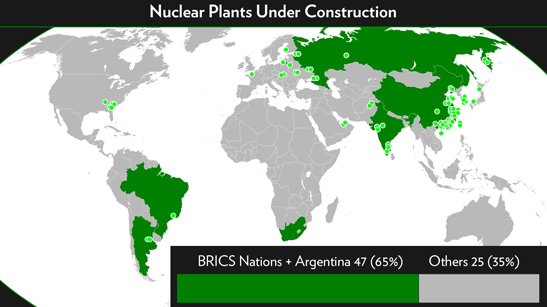
BRICS Nations Move on Nuclear Cooperation
The Unhived Mind
BRICS Nations Move on Nuclear Cooperation
July 31, 2014 • 11:52AM
http://larouchepac.com/node/31445
Russia and China Move Ahead Toward Deploying Floating Nuclear Plants
The export branch of Russia’s Rosatom nuclear company, Rosatom Overseas, signed a memorandum of understanding with China yesterday, to bring the two nuclear nations closer to the joint development of floating nuclear power plant technology. Serious discussions have been ongoing since the end of 2011, as Russia moved toward completion of the first of what will be a fleet of small, marine nuclear energy reactors that are placed on barges for civilian power. These very small reactors will be particularly useful in remote regions, such as the Arctic.
China’s interest in this very flexible nuclear technology has been for oil and gas platforms at sea, as well as to service remote communities. Such reactors could also be used for the propulsion of large cargo ships carrying bulk freight. China-Russia discussions have also included the possibility of jointly promoting projects in third countries, which would help Russia export the systems.
Yesterday’s memorandum, as Reuters reported, may include six floating nuclear plants. Rosatom Overseas chief executive Dzhomart Aliev referred in a statement to the provision of “a reliable power supply, not only to remote settlements but also to large industrial facilities such as oil platforms.”
Russia will deploy the first couple of floating nuclear plants at home, but has been searching for foreign customers. Although other nations have expressed interest, it is most likely that China will be Russia’s first export market.

Russia and India Broaden Frontier Science Cooperation
About a month before the meeting between Russian President Vladimir Putin and Indian Prime Minister Narendra Modi on the sidelines of the BRICS Summit at Fortaleza, where enhanced collaboration between the two countries on nuclear power generation was discussed, a scientific forum, organized by the two countries, was held at the Joint Institute for Nuclear Research (JINR) in the Russian science city of Dubna, India’s Economic Times (ET) reports.
Asia Goes Nuclear
At the forum, discussions took place to set up 22 Russian-assisted nuclear power projects in India. As of now, Russia has built two 1000-MW nuclear plants (one has been commissioned and is producing at 100-percent efficiency, while the other is expected to go on line sometime this year) at Koodankulam, Tamil Nadu (in southwestern India) and has signed an agreement to set up two more at the same site. During the Modi-Putin talks, the Indian premier had suggested that President Putin visit the Koodankulam nuclear power plant during his scheduled visit to India to attend the annual summit dialogue this December.
JINR is an international intergovernmental scientific research organization which was established through the Convention signed on March 26 1956 by eleven founding States, and was registered with the United Nations on Feb. 1, 1957. One of the main aspects of JINR’s activity is its extensive international scientific and technical cooperation: it collaborates with nearly 700 research centers and universities in 64 countries of the world. In Russia alone — the largest JINR partner — the cooperation is conducted with 150 research centers, universities, industrial enterprises, and firms from 43 Russian cities. The main fields of JINR’s activity are theoretical and experimental studies in elementary particle physics, nuclear physics, and condensed matter physics.
More than 60 leading researchers from JINR member states and 20 leading experts from leading scientific research institutions of India participated in the JINR forum. Currently there are two Indian scientists who are working at JINR as employees. One very important part of the forum was a series of visits by the Indian scientists to the unique experimental facilities of JINR, that included the Nuclotron-M in the Laboratory of High Energy Physics, the accelerator complex in the Flerov Laboratory of Nuclear Reactions, and the IBR-2 sodium cooled fast reactor and spectrometer complex in the Frank Laboratory of Neutron Physics. FLNR, IBR-2 reactor and spectrometer complex in FLNP.”
ET reports that there are 18 member states of JINR: Armenia, Azerbaijan, Belarus, Bulgaria, Cuba, Czech Republic, Georgia, Kazakhstan, D. P. Republic of Korea, Moldova, Mongolia, Poland, Romania, Russia, Slovakia, Ukraine, Uzbekistan, and Vietnam. Non-members participating are Egypt, Germany, Hungary, Italy, the Republic of South Africa, and Serbia.
More Countries Look to the BRICS for Survival
Bangladesh is considering joining the new BRICS Development Bank, The Diplomat reported on July 25, citing a report in Bangladesh’s Financial Express. An unnamed Finance Ministry official told the Express that “we will ask the Bangladeshi ambassadors to the BRICS countries to know details about the proposed global bank. After getting details we will decide on our joining in the framework… If the details are found favorable, Bangladesh might consider becoming a proud founding-member with a good amount of fund contribution.”
The official added that “if the BRICS initiative succeeds, we are hopeful of getting more soft and concessional loans in addition to the continuous support from the existing global and regional lenders.”
From the other side of the globe, Guatemala’s Siglo 21 paper cited the head of the School of Economics at the University of San Carlos, Erasmo Velasquez, and others, arguing that Guatemala should turn to the BRICS and its bank in expectation of receiving more favorable conditions for development financing. The view of the author of the opinion column reporting this, Joel Maldonado, added his agreement by titling the article: “Country Should Opt for the BRICS Bank.”
http://theunhivedmind.com/wordpress3/brics-nations-move-on-nuclear-cooperation/
